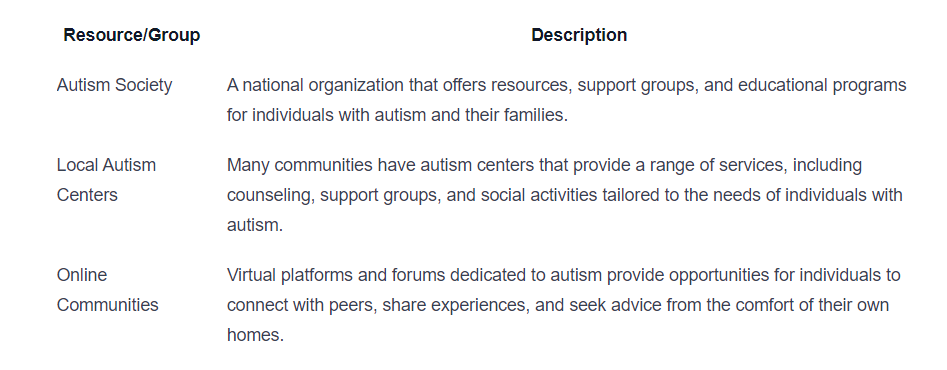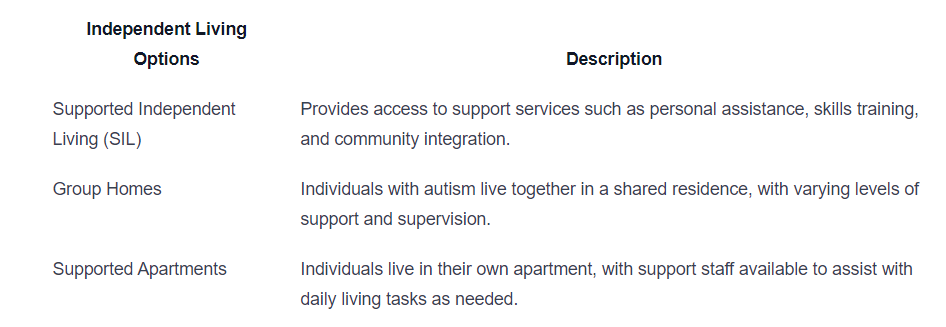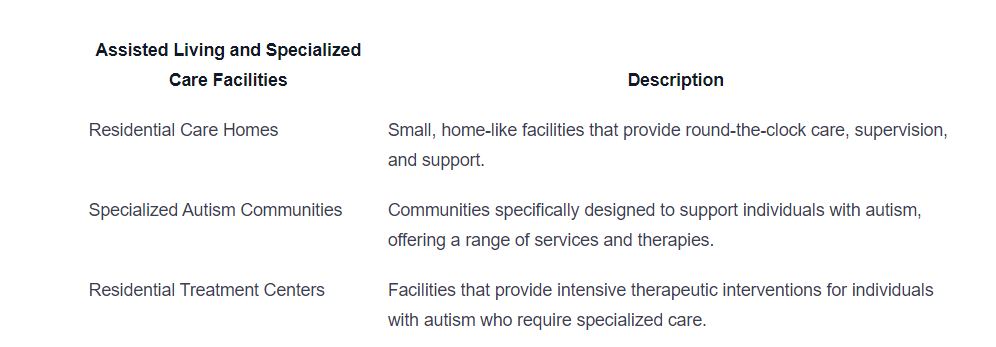Growing Old with Autism
Discover the unique journey of growing old with autism. From health considerations to social connections, explore a lifetime of possibilities.
.jpeg)
Aging with Autism: A Unique Journey
As individuals with autism spectrum disorder (ASD) enter their later years, they embark on a distinctive journey that comes with its own set of challenges and considerations. Understanding ASD and recognizing the difficulties faced by individuals with autism as they age is crucial in providing appropriate support and care.
Understanding Autism Spectrum Disorder (ASD)
Autism Spectrum Disorder (ASD) is a developmental disorder that affects communication, social interaction, and behavior. It is characterized by a range of symptoms and levels of severity, making each individual's experience unique. Some common characteristics of ASD include:
- Difficulty with social interaction and communication, such as challenges in understanding nonverbal cues or maintaining conversations.
- Restricted and repetitive patterns of behavior, interests, or activities, often leading to a need for routine and predictability.
- Sensory sensitivities, where individuals may be over or under sensitive to stimuli like sound, touch, or light.
Autism is a lifelong condition, and while some individuals may experience improvements or changes in their symptoms over time, others may continue to face challenges throughout their lives.
Challenges Faced by Individuals with Autism as They Age
As individuals with autism age, they may encounter unique challenges that require attention and support. Some of these challenges include:
- Healthcare Needs: Individuals with autism may require specialized healthcare services that address their specific needs. This includes finding healthcare providers who are knowledgeable about autism and can effectively communicate and accommodate their requirements.
- Transitioning into Adulthood: The transition from adolescence to adulthood can be particularly challenging for individuals with autism. They may face difficulties in finding employment, living independently, and accessing appropriate educational or vocational opportunities.
- Social Isolation: Social interactions can be complex for individuals with autism, and as they age, they may experience social isolation or struggle to maintain relationships. It is essential to provide opportunities for social engagement and support to combat loneliness and promote well-being.
- Age-related Changes: Aging brings its own set of changes, and individuals with autism may struggle to adapt. They may find it challenging to navigate new routines, cope with sensory changes, or manage increased anxiety related to the aging process.
Understanding and addressing these challenges is crucial in ensuring that individuals with autism receive the necessary support and resources as they age. By providing tailored healthcare, promoting social connections, and creating inclusive environments, we can help individuals with autism navigate their unique journey of growing old with autism.
Health and Well-being
As individuals with autism age, it is important to address their unique health and well-being needs. This section explores the physical health considerations and mental health support available for aging adults with autism.
Physical Health Considerations
Aging adults with autism may face certain physical health considerations that require attention and care. These considerations can vary from person to person, but some common areas to focus on include:
- Routine Medical Care: Regular medical check-ups are essential to monitor overall health and address any specific concerns. This includes screenings for conditions that may be more prevalent in individuals with autism, such as epilepsy, gastrointestinal issues, and sleep disorders.
- Healthy Lifestyle: Encouraging a healthy lifestyle can contribute to the well-being of aging adults with autism. This includes maintaining a balanced diet, engaging in regular physical activity that suits their abilities and preferences, and promoting good sleep hygiene.
- Sensory Sensitivities: Sensory sensitivities are often associated with autism and can impact an individual's overall well-being. It is important to create environments that are sensory-friendly and minimize potential triggers that may cause distress.
- Medication Management: Some individuals with autism may require medication to manage co-occurring conditions or address specific symptoms. It is crucial to work closely with healthcare professionals to ensure proper medication management, including adherence to prescribed regimens and monitoring for any potential side effects.
Mental Health Support for Aging Adults with Autism
Mental health support is vital for aging adults with autism as they navigate the challenges associated with aging and their unique experiences. Some key aspects of mental health support include:
- Access to Mental Health Services: It is important to ensure that aging adults with autism have access to mental health professionals who are knowledgeable about autism and can provide appropriate support. These professionals can help address mental health concerns such as anxiety, depression, and emotional regulation difficulties.
- Communication and Social Skills: Building and maintaining social connections can significantly contribute to the well-being of aging adults with autism. Supportive therapies and interventions focused on communication and social skills development can help improve social interactions and reduce feelings of isolation.
- Cognitive Functioning: Some individuals with autism may experience changes in cognitive functioning as they age. Cognitive assessments and interventions can help identify any changes and develop strategies to support cognitive well-being.
- Transition Planning: Transition planning is essential to ensure a smooth transition into different stages of life for aging adults with autism. This includes planning for changes in living arrangements, healthcare providers, and support systems.
Mental health support should be tailored to the individual's specific needs and preferences. Regular communication with healthcare professionals, caregivers, and support networks can help address any mental health concerns and provide necessary support throughout the aging process.
By addressing physical health considerations and providing appropriate mental health support, we can promote the overall well-being and quality of life for aging adults with autism. It is important to recognize and honor the unique journey of growing old with autism, ensuring that individuals receive the care and support they need to thrive.
Social Connections and Support Systems
As individuals with autism age, social connections and support systems play a crucial role in their overall well-being and quality of life. Nurturing relationships and accessing community resources and support groups can provide valuable assistance and enhance their journey of growing old with autism.
Building and Maintaining Relationships
Building and maintaining relationships can be challenging for individuals with autism due to difficulties in social communication and interaction. However, with proper support and understanding, meaningful connections can be established. Here are some strategies to foster relationships:
- Social Skills Training: Participating in social skills training programs can help individuals with autism develop effective communication skills, enhance their understanding of social cues, and improve their ability to initiate and maintain conversations.
- Peer Support Groups: Joining peer support groups specifically designed for individuals with autism can provide a safe and inclusive space to connect with others who share similar experiences. These groups often offer opportunities for social interaction, skill-building workshops, and emotional support.
Community Resources and Support Groups
Accessing community resources and support groups is essential for individuals with autism as they age. These resources and groups can provide valuable assistance, guidance, and a sense of belonging. Here are some examples:

By utilizing these community resources and support groups, individuals with autism can access valuable information, connect with others who understand their unique challenges, and find the support they need to navigate the complexities of growing old with autism.
Creating and maintaining social connections, along with utilizing community resources and support groups, can greatly enhance the well-being and quality of life for individuals with autism as they age. These connections and resources offer a sense of belonging, understanding, and support that are vital for their continued growth and fulfillment.
Housing and Living Arrangements
As individuals with autism grow older, considerations for housing and living arrangements become increasingly important. The right living environment can play a significant role in promoting independence, providing necessary support, and ensuring a high quality of life. In this section, we will explore two common options for individuals with autism: independent living and assisted living or specialized care facilities.
Independent Living Options
Independent living refers to individuals with autism living on their own or with minimal support in a community setting. This option allows for greater autonomy and the opportunity to develop essential life skills. However, the level of independence achievable may vary depending on the individual's abilities and support systems available.

When considering independent living options, it's crucial to assess the individual's abilities, support needs, and preferences. Access to community resources, transportation, and social opportunities should also be taken into account to ensure a well-rounded and fulfilling living experience.
Assisted Living and Specialized Care Facilities
Assisted living and specialized care facilities are designed to provide a higher level of support and supervision for individuals with autism who may require more comprehensive assistance with daily living activities. These facilities offer a structured and supportive environment tailored to the unique needs of individuals with autism.

Assisted living and specialized care facilities can offer a sense of security and a structured routine for individuals with autism. These environments often have staff trained in working with individuals on the autism spectrum and can provide additional services such as therapy, vocational training, and social activities.
The choice between independent living and assisted living or specialized care facilities depends on the individual's needs, abilities, and level of support required. It's essential to carefully assess the options available, consider the individual's preferences, and involve their support network in the decision-making process. The goal is to find a living arrangement that promotes autonomy, safety, and overall well-being while accommodating the unique challenges and strengths of individuals with autism.
Financial Planning and Legal Considerations
As individuals with autism grow older, it becomes increasingly important to address financial planning and legal considerations to ensure their long-term well-being and stability. This section explores two key aspects in this regard: securing financial stability and legal guardianship and decision-making support.
Securing Financial Stability
Securing financial stability is crucial for individuals with autism as they age. It involves careful planning and consideration of various factors to ensure their financial needs are met. Below are some key considerations:
- Income Sources: Identify and explore different income sources that can provide financial support, such as employment, government benefits, and disability benefits.
- Budgeting and Financial Planning: Develop a comprehensive budget that takes into account daily expenses, healthcare costs, and future needs. Financial planning can help ensure that there are sufficient funds to cover essential expenses and save for the future.
- Specialized Financial Advisors: Seek guidance from financial advisors who have experience working with individuals with autism. They can provide valuable insights and assistance in creating a personalized financial plan.
- Government Programs and Assistance: Research government programs and assistance available for individuals with disabilities. These may include housing subsidies, healthcare coverage, and vocational training programs.
Legal Guardianship and Decision-Making Support
Legal guardianship and decision-making support are essential to protect the rights and interests of aging individuals with autism. Here are key considerations in this area:
- Guardianship Options: Explore the different types of guardianship available, such as full guardianship, limited guardianship, or supported decision-making. Each option has varying levels of decision-making authority and should be chosen based on the individual's abilities and needs.
- Power of Attorney: Consider granting power of attorney to a trusted family member or advocate who can make financial and legal decisions on behalf of the individual, if necessary.
- Special Needs Trusts: Establish a special needs trust to manage and protect financial assets while ensuring continued eligibility for government benefits. This can help provide for the individual's long-term financial needs.
- Healthcare Directives: Create healthcare directives, such as a living will or healthcare power of attorney, to outline the individual's medical wishes and appoint someone to make healthcare decisions if they are unable to do so.
It is important to consult with legal professionals who specialize in disability law to ensure that all financial and legal arrangements are properly established and aligned with the individual's specific circumstances.
By addressing financial planning and legal considerations, individuals with autism can have a more secure and stable future. These measures help safeguard their financial well-being and ensure that their rights and interests are protected as they navigate the journey of growing old with autism.
Navigating the Future
As individuals with autism grow older, it becomes crucial to navigate the future with a focus on advocacy, self-advocacy, embracing growth, and adaptation. This section explores the importance of these aspects in the journey of growing old with autism.
Advocacy and Self-Advocacy
Advocacy plays a vital role in ensuring that individuals with autism have their voices heard and their rights protected. Advocacy can come from various sources, including family members, caregivers, and professionals who specialize in supporting individuals with autism.
Self-advocacy is equally important, as it empowers individuals with autism to express their needs, preferences, and goals. By developing self-advocacy skills, individuals with autism can actively participate in decision-making processes regarding their healthcare, living arrangements, and other aspects of their lives.
Advocacy and self-advocacy can be further enhanced through access to support networks and organizations that specialize in autism. These resources provide valuable guidance, information, and assistance to individuals with autism and their families.
Embracing Growth and Adaptation
Embracing growth and adaptation is essential in the journey of growing old with autism. As individuals with autism age, their needs, challenges, and strengths may evolve. It is important to recognize and adapt to these changes to ensure the best possible quality of life.
Growth can be nurtured through continued learning and skill development. This may include participating in educational programs, vocational training, or engaging in hobbies and activities that promote personal growth and development. It is crucial to provide opportunities for individuals with autism to explore and cultivate their interests and talents.
Adaptation involves adjusting to new circumstances and finding innovative solutions to challenges. This may include modifying living arrangements, seeking additional support services, or implementing strategies to address changing healthcare needs. By embracing adaptation, individuals with autism can navigate the evolving landscape of aging with greater resilience and confidence.
Through advocacy, self-advocacy, and a willingness to embrace growth and adaptation, individuals with autism can navigate the future with a sense of empowerment and purpose. It is important to recognize their unique strengths and support them in realizing their full potential, ensuring a fulfilling and meaningful journey as they grow old with autism.
Sources
https://www.retireguide.com/guides/seniors-autism-spectrum/
https://www.thetransmitter.org/spectrum/growing-old-with-autism/
https://sparkforautism.org/discover_article/autism-older-adults/
Similar articles
We’re here to help you

Our team is here to assist you in this process. Contact us for any assistance.
it’s easy to apply
We Accept Most Insurances
Our in-network insurance partnerships make ABA therapy more accessible to families throughout our service areas.







Our Insurance Process
We'll request your insurance details to help us verify your plan's coverage for ABA therapy. Once we've received this information, we'll walk you through your benefits, including copayments, deductibles and out-of-pocket maximums, so you know what to expect in advance.
Our team will then handle the preauthorization and all the necessary paperwork.
.svg)





















.jpeg)


































.jpeg)




.jpeg)


















.jpeg)
















